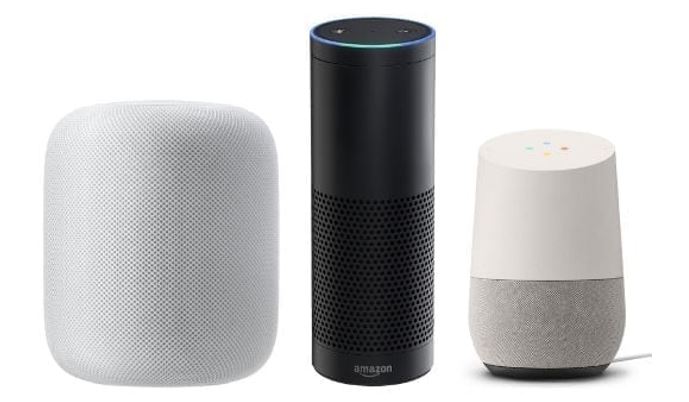Although smart home technology can bring comfort and security to some users, the always-on microphone may also have security risks.
The smart device market is exploding, and smart home kits for retrofitting “non-smart” homes devices are getting cheaper. Earlier this year, Apple released HomePod speakers, the company’s response to mainstream smart devices such as Google Home and Amazon Echo. Amazon is also expanding its product line, and recently it launched Amazon Echo Look, which promises to make users more stylish.
All of these smart devices are equipped with artificial intelligence called Virtual assistant, that allows users to interact with other devices without having to do anything. These devices voice will make your life easier, but they have one thing in common: usually always need to turn on the microphone to listen to your request.
According to some researches suggest that people may find these smart devices equipped with always-on microphones as attractive but also disturbing too.
Convenience is important
First, smart devices offer superior convenience at an unprecedented cost. Amazon, Apple, Microsoft, and Google are all selling their products and outsourcing tasks to increase user productivity. The rich have long relied on the labor of others to manage their homes and workplaces, and smart home technology has similar effects. They can automate housework, including vacuuming, shopping, and even cooking.
Artificial intelligence, algorithms, and automation can now perform tasks for people who can afford smart devices. As a result, more and more people may choose an assistant than a human assistant who can use or afford it.
Increased autonomy
For example, hands-free technology can increase the autonomy of the elderly and disabled. Scholars are investigating how smart devices support “universal design,” a creative design activity that works best for all users. Smart home systems can help people with physical or cognitive disabilities by automating key activities and services, such as opening and closing doors, or contacting medical personnel.
Such a system can provide people with more autonomy. Imagine a home equipped with a smart home system that allows people with cognitive disabilities to “keep in a more independent and natural environment”. Interviews with older users show that techniques for monitoring a person’s health and family activities can help people “age”.
Ubiquitous surveillance and security issues
While smart home technology can bring comfort and security to some users, always-on microphones can also pose a security risk.
A smart home system is part of a larger set of devices, applications, websites, and spaces used to collect, aggregate, and analyze a user’s personal data. Scholars call this “ubiquitous surveillance,” which means “more and more difficult to escape… data collection, storage, and classification.”
Smart devices need data from you and others to provide you with a good service. In order to get the full advantage of smart home systems, users must share their location, habits, musical tastes, shopping history and more. On the one hand, well-connected devices can manage your digital life well.
On the other hand, providing so much personal information is good for companies like Amazon. When they get personal information from users, they may monetize the information in the form of targeted advertising, or collect and sell your personal characteristics, even if these features are separate from your name or address, perhaps that’s why Wired Magazine says, “ The next big business for Amazon is to sell you”. Not all companies have the same privacy policy, and Apple says it will not sell users’ personal information to others. However, potential users should decide how much private life they are willing to share.
Smart homes bring a wider range of security issues, and unsecured devices connected to the Internet of Things may be the target of choice for hackers. Accessing smart devices may provide hackers with a wealth of useful data, including information about when users are going home or not at home. In addition, smart objects can be secretly deployed for evil purposes. In 2016, the Mirai botnet enlisted unsuspecting user IoT devices for distributed denial of service attacks.
There is another risk, maybe not so exciting: devices with always-on microphones can’t tell who is talking. Recently, Alexa users reported that their children ordered unwanted items from Amazon, and others pointed out that background sounds, such as television, caused unauthorized purchases to occur. These sound triggers – called “false positives” when they prompt the device to do something unexpected or unwanted – cause the user to unwittingly share a private conversation with others.
At the beginning of 2018, when Alexa began to laugh, Amazon Echo users were forced to face these security risks, apparently, this device was spontaneous. Although Amazon later said that this kind of laughter was a false reaction to nearby conversations, the laughter prompted some users to reconsider whether Alexa would enter their most intimate space.
Human-like objects
In addition to potential surveillance and security issues, users must consider the consequences of a human-like virtual assistant in a smart device. Siri, Alexa, Cortana, and the current US bank assistant Erica are gender feminine, not just because of their voice, it is no coincidence. Historically, women have been assigned to tasks related to their role as mothers or wives, and as women join the workforce, they continue to play these roles in “pink collar jobs”.
Siri and Alexa perform similar tasks, both for the user and for management support, and some even think Alexa is a member of the family.
Furthermore, the addition of gendered virtual assistants will attract users to use smart devices because they are both familiar and comfortable. Some users are willing to share more details about their own privacy, despite security or monitoring risks. Ultimately, people may become more and more dependent on devices that can empower those who have access to data from their homes.
Smart device users must weigh the significant convenience and substantial issues with always-on microphone devices. Some of these concerns – safety and surveillance – are pragmatic, others – whether equipment should be gender – are clearly more philosophical. The most important thing is that when people ask for equipment to serve them, they must be willing to live with the other person (or who).
Source: “IoTian Home Network”.


Related Posts
AirGo Vision- Solos’ Smart Glasses with AI Integration from ChatGPT, Gemini, and Claude
Rise of deepfake technology. How is it impacting society?
OpenAI’s Critic GPT- The New Standard for GPT- 4 Evaluation and Improvement
Claude 3.5 Takes the Lead- Why It’s Better Than GPT-4
Smartphone Apps Get Smarter- Meta AI’s Integration Across Popular Platforms
How to set Gemini by Google as the default Android assistant